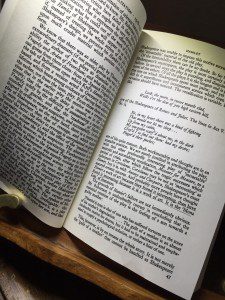There are desires so intense that they can overwhelm us: this can be a great pleasure or a great danger.
Art can stir great passion in us . . . even poor art. One reason to educate ourselves in the arts is to avoid being manipulated by bad artists, learning to outgrow their tricks, and gaining the ability to be moved by great art. Another is that the very best art stimulates the intense feeling that can wreck a man if it comes on him unaware. These passions (and please do not limit these basic feelings to the sexual) arise and if they are great enough can make reason impossible.
They are not foreign to us, our feelings are part of us, but they can prevent us from acting as we would. A drunken man is neither himself nor not himself. The actions he commits, putting the lampshade on his head or stealing the company funds, were always possibilities to him. They would not occur to a different sort of drunken man because he has never desired to behave clownishly or to be a thief. Yet the drunken clown or thief is not himself wholly because his reason is also part of him and the drink has suppressed his reason.

In Laws (Book II) Plato suggests philosophical training may require beer for this very reason. We can see how well trained a man is when he is a bit elevated . . . or so Plato suggests. A better suggestion for training is to train ourselves to “take it.” Allowing great art to stimulate us and then thinking it through is a kind of drunkenness without a hangover.
How does art do this? How does an artist, a writer for example, make words, themselves containing no emotion, produce an emotion in us?
In his essay Hamlet TS Eliot writes:
The only way of expressing emotion in the form of art is by finding an ‘objective correlative’; in other words, a set of objects, a situation, a chain of events which shall be the formula of that particular emotion.
My daughter, Mary Kate, who pointed me to this essay explained that a simple example of an objective correlative in art is the heart shape. It looks nothing like a heart, but I have been trained to have certain feelings about it. In fact, the idea of “heart” being the seat of love is itself an objective correlative to an emotion since the organ we call the heart is not love in itself. Even words that are “direct” like “love” are terms that we are trained to associate with the emotion. The English word “love” is not associated with passion in the minds of non-English speaking humans.
Eliot suggests:
The intense feeling, ecstatic or terrible, without an object or exceeding its object is something which every person of sensibility has known; it is doubtless a subject of study for pathologists. It often occurs in adolescence: the ordinary person puts these feelings to sleep, or trims down his feelings to fit the business world; the artist keeps them alive by his ability to intensify the world to his emotions.
Eliot is right. Most experience these intense feelings and many put them to sleep or moderate them. This is dangerous when it is not tragic because such a trained beast is still a beast: there is a reason that a staple of movie plots is the business man surprised by love and swept away. The solution of the artist does not seem any better to me: the artist falsifies the world to make his experience match his emotional reactions.
He bends reality to his will in his art. Does this create a sub-reality? If so, then this sub-creation (to use Tolkien’s term for the act) is the most divine of human actions. We also have the ability to own our real emotions, passions that are there, without connecting them to a particular action.
We get the rush of feeling without thinking: “Oh! I feel this so I must do this . . . ”
But doesn’t Plato provide Eliot an even better option? What if the artist can use art to push to see the source of these intense emotions? I take the source to be the very good that undergirds the cosmos. This is the method of Diotima in Symposium where we see the correlative in the art to rouse our passion, but allow the passion to drive us past the object (“Not quite,” the lover says, “but close!”) to something else.
As a Christian, I think that when my passion drives me past all the symbols, including this present creation, I will see God: the very ground of all being. Our emotions are more intense than any reality can sustain. Romantics like I am are seemingly cursed with greater “feels” than reality can sustain or explain. In the Good (and this is God) I find the adequate Beloved.
The cosmos is God’s great objective correlative to us: it stimulates us to this intense passion that it cannot by itself fully explain. The Artist then draws us to Himself: He does not have to “intensify” His reality. His love is all sufficient, consuming, and good.











